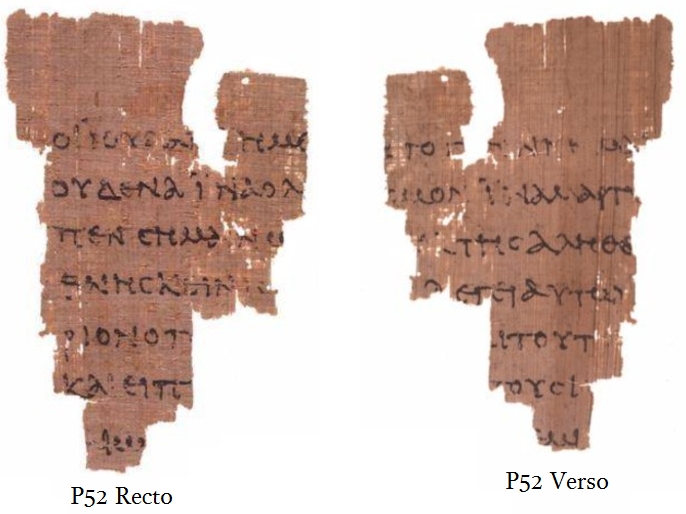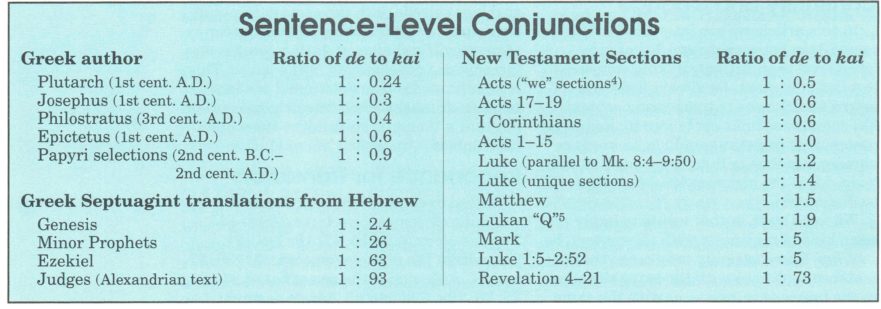By analyzing the meaning of the word translated “desert,” the topography at the Feeding of the Five Thousand can be clarified.
What Was Simon Peter Wearing When He Plunged into the Sea?

Was Peter actually fishing naked, or was he merely “stripped to the waist,” as the Living Bible says? And what did he put on before swimming to Jesus?
Hendiadys in the Synoptic Gospels

Hebraisms are as ubiquitous in the Synoptic Gospels as cats in Jerusalem.
Anti-Jewish Tendencies in the Synoptic Gospels

The scourge of anti-Semitism has not departed from the Church. Though recently there have been encouraging signs, many Christians still harbor prejudice against Jews. The Synoptic Gospels may have helped spawn this prejudice. They may even play a continuing role in perpetuating it.
Paraphrastic Gospels

As Robert Lindsey realized in 1962, Mark reworked Luke’s Gospel in writing his own. Mark liked to substitute synonyms for nearly anything that Luke wrote. If, for instance, Luke used the singular of a noun, Mark substituted the plural form of the same noun in writing his Gospel. And vice versa: if Luke used the plural, Mark substituted the singular. In this article, Robert Lindsey surveys a unique substitution category found in Mark’s Gospel: the replacing of one verse of Scripture with another.
“And” or “In order to” Remarry?

Apparently, contrary to normal Greek usage, Greek’s kai (“and”) in the sense of “in order to” occurs in the Synoptic Gospels.
John’s Targumic Allusions

However one translates John 1:17, both clauses should be positively portrayed. After all, it is John himself who states that “salvation is of the Jews” (John 4:22) and that “the Hebrew Scriptures testify about Jesus” (John 5:39).
That Small-fry Herod Antipas, or When a Fox Is Not a Fox

We need to start translating “fox” with its proper Hebraic cultural meaning.
The Miraculous Catch: Reflections on the Research of Mendel Nun

Mendel Nun’s research is important in illuminating many Gospel stories.
Inspiration, History and Bible Translation

To believe in the Christian Bible is also to believe in God’s working through the church, and to believe in the church is also to believe in its constitutional documents, the Hebrew Bible and the New Testament.
Reconstructing the Words of Jesus

If we keep in mind that Jesus and his disciples and hearers were not speaking Greek but rather Hebrew or Aramaic, or both, then we can see that we will only arrive at Jesus’ original words by translating the Greek texts of speeches in the synoptic Gospels back into their Semitic original.
“He Shall Be Called a Nazarene”

One of the titles given to Jesus was “Nazarene.” Where did the title come from, and did it have any special significance? Ray Pritz traces the title’s origins.
The Fallacy of Sacred Name Bibles

Some Christian teachers argue that it is wrong to translate God’s personal name as “LORD,” and that English Bible translators should use “Yahweh” instead.
The Parable of the Rich Man and Lazarus: Did the Rich Man End Up in Hell or Gehenna? (Luke 16:22)

Mechanically reconstructing to Hebrew Greek texts found in Matthew, Mark and Luke on the basis of Septuagintal equivalents can widely miss the mark.
Pursuing Righteousness

A reconstruction can only be adopted by a theologian or a historian. A Bible translator must translate what the text of Scripture actually says.
The Divine Name in the Hebrew New Testament

God has a personal name: YHVH. Like Semitic names in general, it was intended to reflect something of the bearer’s character. YHVH is related to the root h-v-h, “to be”, and reflects God’s eternity and timelessness.
“And” or “But”—So What?

Writings that were originally composed in Greek tend to have a higher ratio of de to kai than writings that have been influenced by a Semitic language.
What Is the Priest Doing? Common Sense and Culture

Common sense is connected to cultural expectations. What is understandable in one culture may be opaque in another.

